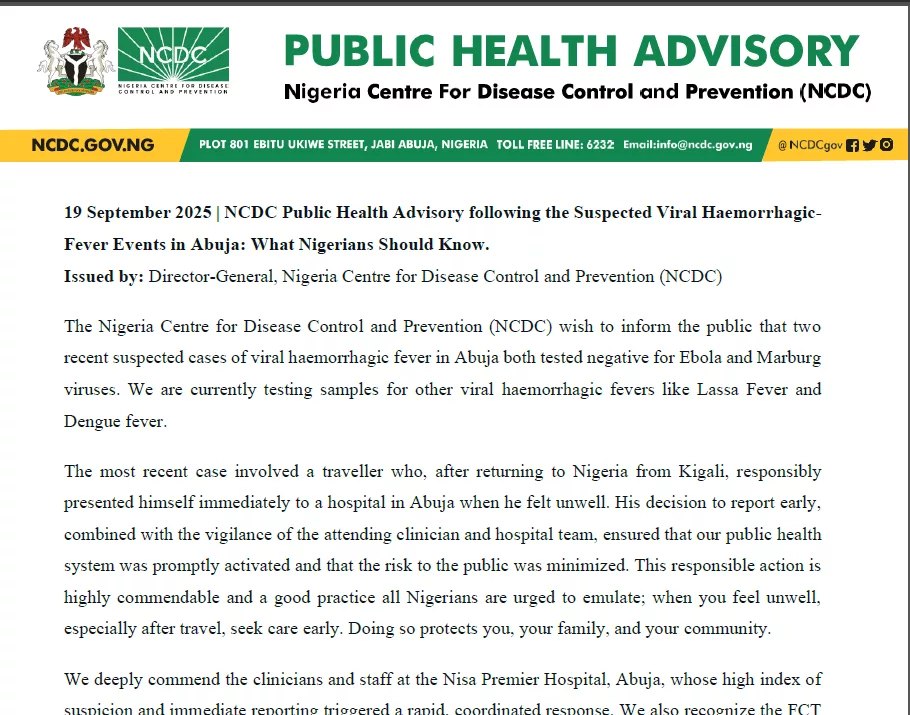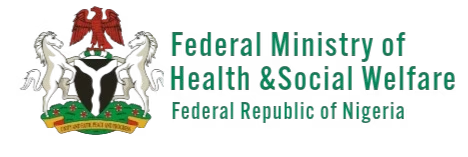Issued by: Director-General, Nigeria Centre for Disease Control and Prevention (NCDC)
The Nigeria Centre for Disease Control and Prevention (NCDC) wish to inform the public that two recent suspected cases of viral haemorrhagic fever in Abuja both tested negative for Ebola and Marburg viruses. We are currently testing samples for other viral haemorrhagic fevers like Lassa Fever and Dengue fever.
The most recent case involved a traveller who, after returning to Nigeria from Kigali, responsibly presented himself immediately to a hospital in Abuja when he felt unwell. His decision to report early, combined with the vigilance of the attending clinician and hospital team, ensured that our public health system was promptly activated and that the risk to the public was minimized. This responsible action is highly commendable and a good practice all Nigerians are urged to emulate; when you feel unwell, especially after travel, seek care early. Doing so protects you, your family, and your community.
We deeply commend the clinicians and staff at the Nisa Premier Hospital, Abuja, whose high index of suspicion and immediate reporting triggered a rapid, coordinated response. We also recognize the FCT Epidemiology and Rapid Response Teams, the Port Health Services, the National Reference Laboratory, airline and immigration partners, and other stakeholders whose swift collaboration with NCDC demonstrates the strength of Nigeria’s preparedness system. Together, their actions exemplify how vigilance and teamwork prevent potential public-health emergencies.
What NCDC is doing to protect Nigerians
We are currently collating and analysing all the relevant data and information to improve our response.
As part of its mandate to safeguard the health of the nation, the NCDC has already conducted a Dynamic Risk Assessment following recent reports of Ebola viral disease in other countries, and anticipatory measures are being implemented nationwide. We have activated multidisciplinary collaboration with federal and state health authorities, strengthening surveillance at points of entry, placed isolation/treatment facilities on alert, and prepositioning critical infection-prevention and related case management supplies. The NCDC national reference laboratories remain on standby to provide rapid testing, and public-health teams are ready to conduct contact tracing if needed.
Beyond these immediate steps, NCDC is also working with states and partners to strengthen readiness across all 36 states and the FCT. This includes upgrading isolation facilities, reinforcing IPC training for healthcare workers, conducting simulation exercises, and ensuring a clear pathway for access to medical countermeasures such as vaccines and therapeutics if ever required.
What states, healthcare workers, and facilities need to do
State Governments and Ministries of Health must continue to support disease-surveillance officers, ensure isolation centres are functional, and provide necessary resources for rapid response.
Healthcare workers in both public and private facilities must maintain a high index of suspicion, always apply strict infection-prevention measures, and report unusual cases immediately through the established IDSR channels. Private hospitals in particular play a critical role in early detection and must be fully integrated into surveillance and preparedness efforts at all levels.
ABOUT EBOLA VIRUS DISEASE
Ebola virus disease (EVD), formerly known as Ebola Haemorrhagic Fever, is a severe, often deadly disease caused by the Ebola virus, with a fatality rate of 25-90%. There are 5 distinct species of this Virus: Bundibugyo, Reston, Tai Forest, Sudan, and the Zaire (the one responsible for the current case in the DRC).
How is Ebola Virus Disease Transmitted
People become infected with Ebola ether through contact with infected live or dead animals (usually following butchering, cooking or eating) or through contact with the body fluids of infected humans. Most cases are caused by human-to-human transmission which occurs when blood or bodily fluids or secretions (stool, urine, semen) of infected people enter a person’s body through broken skin or mucous membranes. During an outbreak, those at higher risk of infection are health workers, family members or others in close contact with the deceased, infected people and mourners who have direct contact with bodies during burial rituals.
The incubation period, i.e. the time interval from infection to the development of signs and symptoms, ranges from 2-21 days.
Signs and symptoms
Ebola symptoms vary but commonly experienced symptoms are:
• Sudden onset of fever, intense weakness, muscle pain, headache and sore through are commonly experienced at the beginning of the disease.
• Other symptoms that follow are vomiting and diarrhoea and yellowness of the eyes.
The following may occur in severe cases:
• Uncontrolled bleeding from body orifices, dysfunction and / or failure of several body organs such as the kidneys, liver, also the central nervous system may become involved with eventual progressing to shock and death.
• In fatal cases, death often occurs between 8 and 9 days of the onset of symptoms.
What the public and private sector need to do
While vaccines and therapeutics are available for some Ebola strains, early recognition, isolation, and supportive treatment remain the most effective ways to save lives. IPC measures, safe burials, and contact tracing are equally critical to breaking chains of transmission.
• This was the second suspected Ebola case NCDC responded to in a week; both were negative.
• Both events of suspected Ebola virus disease were reported by clinicians with high index of suspicion who alerted the Public Health team in a timely manner allowing the system to swing into action and resolve the issue withing 48 hours.
Nigerians are therefore urged to:
• Practice good hand hygiene – wash hands with soap under running water or use alcohol-based sanitizers.
• Avoid contact with symptomatic persons – do not touch anyone with unexplained fever, bleeding, vomiting, or diarrhoea.
• Minimize animal-to-human risk – avoid contact with fruit bats, monkeys, or apes; handle animals with gloves and protective clothing; ensure animal products are thoroughly cooked before eating.
• Avoid contact with body fluids – including blood, vomit, saliva, urine, or other fluids from suspected or confirmed cases.
• Seek help immediately – if you or someone with a travel history to affected countries develops symptoms, call 6232 or your State Ministry of Health hotline for guidance.
• Avoid rumours: rely on official and authorized sources – we strongly caution against sharing unverified and unauthorized messages or rumours on social media platforms. Misinformation fuels fear and stigma, discourages people from seeking care, reporting events of public health importance and undermines public-health response. Please rely only on official updates from NCDC and authorized government sources.
For information or to report suspected cases, please contact the NCDC Connect Centre (24/7):
• Toll-free: 6232
• Email: info@ncdc.gov.ng
Closing
These recent events are a reminder that the vigilance of one clinician, the responsibility of one patient, and the cooperation of all relevant stakeholders can protect millions. We salute the traveller who responsibly sought care early, the private hospital that responded swiftly, the health workers and institutions who collaborated with NCDC and whose professionalism has been found helpful in keeping Nigeria safe.
The NCDC remains fully committed to protecting the health of all Nigerians. With continued vigilance, collaboration across public and private sectors, and the support of the general public, we can prevent, detect, and respond effectively to any public-health threat. Let us all play our part; by seeking care early, adhering to safe practices, and relying only on trusted sources of information. Together, we can ensure that outbreaks are stopped before they start.
CONTACT
NCDC Toll-free Number: 6232| X: NCDCGov | Facebook: @NCDCgov | Instagram: @NCDCgov | NCDC Media Releases
Signed:
Dr. Jide Idris
Director General
Nigeria Centre for Disease Control and Prevention.



